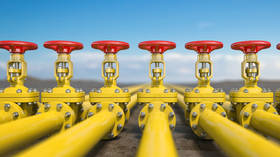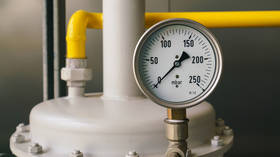Russia boosts gas flows to Europe through Ukraine

Russia is shipping more natural gas through Ukraine than before the start of its military operation in the country, and paying Kiev for transit in full and in hard currency, Yury Vitrenko, the CEO of Ukraine’s largest state-owned oil and gas company, Naftogaz, told Bloomberg TV on Tuesday.
Ukraine will continue shipping Russian gas through its pipelines to Europe “as long as it’s technically possible,” Vitrenko said, adding that the Russian forces were taking care not to damage the transit infrastructure.
The Ukrainian gas pipeline network is one of the routes that Russian energy giant Gazprom uses to deliver natural gas to its European customers, who at the moment receive 40% of the gas they need from Russia. Under the contract for 2020-24, Gazprom ships 40 billion cubic meters of natural gas a year through the Ukrainian transit infrastructure. Last year, the transit amounted to 41.66 billion cubic meters. According to earlier reports, Gazprom pays Ukraine roughly $2 billion per year for its transit services.
According to Vitrenko, Russian companies that are not subject to restrictions can use their accounts in the West despite the sanctions, can receive money from oil and gas sales, and pay Ukraine for transit. The Naftogaz CEO called on Europe and its allies to put Moscow’s revenues for energy flows in an escrow account until the Russian troops withdraw.
The EU has imposed several rounds of sanctions on Russia to try to cut off the cash flow to the government and force it to abandon its military operation in Ukraine. The bloc also pledged to reduce its dependency on Russian gas by two-thirds this year and to wean itself off completely before 2030.
Since the start of Russia’s military operation in Ukraine, gas flows to Europe soared to the highest level since December, according to Bloomberg. Ukraine’s gas transit network operator reported a 20% daily increase in capacity bookings during the period, and Gazprom confirmed that supplies increased due to more orders from European customers. In the first two weeks of March, Gazprom’s deliveries to Europe were at the highest level since last August.
The increase in imports from Russia – which is the second largest producer of natural gas globally – reflects the lack of options Europe has in the short-term to meet natural gas demand, JPMorgan Chase said in a report last week.
For more stories on economy & finance visit RT's business section













